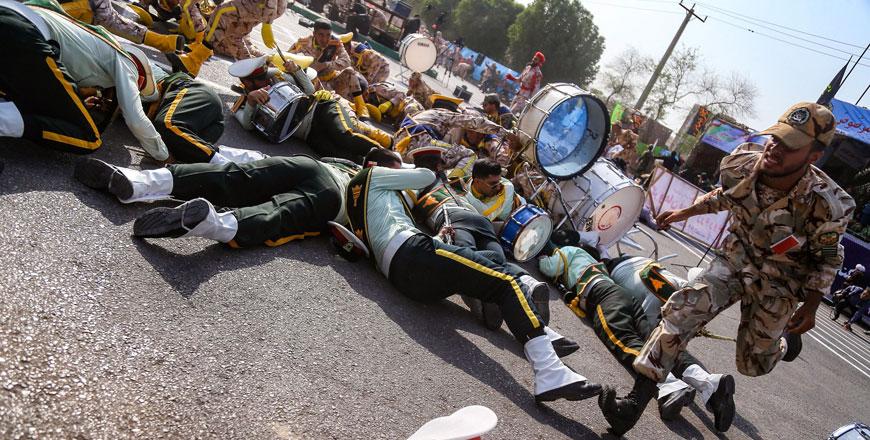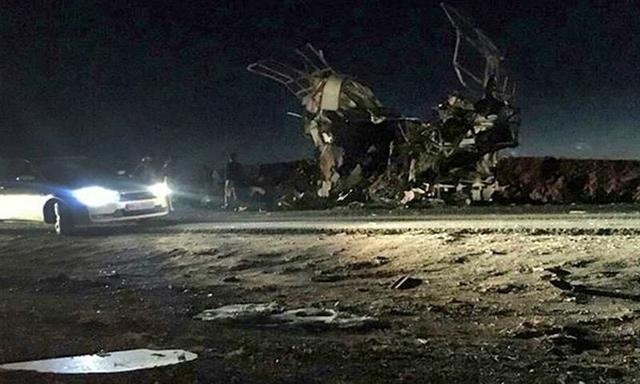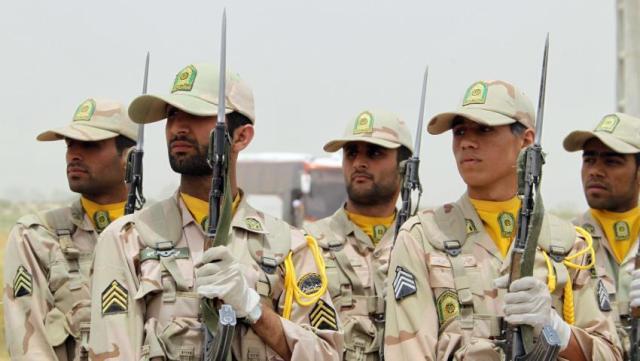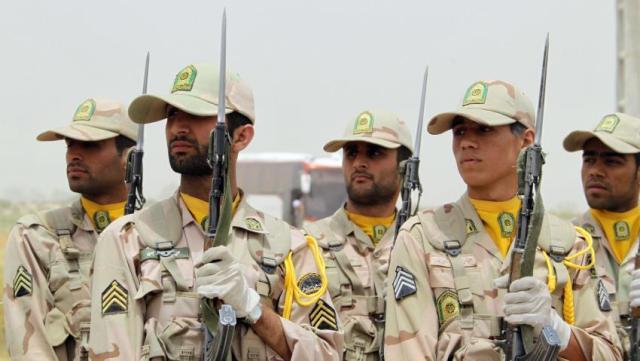You are here
Recent attacks in Iran by militant groups
By AFP - Sep 23,2018 - Last updated at Sep 23,2018

A soldier running past injured comrades lying on the ground at the scene of an attack on a military parade in the south-western Iranian city of Ahvaz on Saturday (AFP photo)
TEHRAN — The Daesh group claimed a deadly gun assault against a military parade in the city of Ahvaz in south-western Iran on Saturday, its second major attack in the Islamic republic in 15 months.
Compared to regional peers, Iran has suffered only sporadic attacks in recent years.
But a number of groups represent a threat to the Shiite powerhouse, including Kurdish separatists and Sunni extremists.
Tehran regularly accuses Saudi Arabia and the US of supporting anti-Iranian "terrorists".
The Daesh group
An attack early on September 22 in Ahvaz kills at least 29 and wounds scores of people, according to Arabic language state TV Al Alam.
Women and children are among the dead, as people gathered to mark the anniversary of the start of the 1980-1988 war with Iraq.
The deadly gun assault is claimed by Daesh on its propaganda agency Amaq, but Iran's Foreign Minister Mohammad Javad Zarif blames "terrorists recruited, trained, armed and paid by a foreign regime". He holds the US accountable.
Ahvaz lies in Khuzestan, a province bordering Iraq that has a large ethnic Arab community and has seen separatist violence in the past.
Daesh claimed its first attack in Iran on June 7, 2017, when gunmen and suicide bombers hit the parliament in Tehran and the shrine of revolutionary leader Ayatollah Ruhollah Khomeini, killing 17 people and injuring dozens.
In a video released in March 2017, the terrorists threatened to retaliate against Iran for its military and logistical support to the Syrian and Iraqi governments, as Damascus and Baghdad battled Daesh insurgencies.
The militants said they wanted to conquer Iran to "return it to the Sunni Muslim nation" and to provoke a Shiite bloodbath.
Jundallah (Soldiers of God)
This extremist Sunni group began a bloody rebellion against the Islamic republic in 2000.
It draws on support from the Baluch ethnic group, which has a major presence in Sistan-Baluchistan province, bordering Pakistan and Afghanistan. The group has rear bases in both countries.
Tehran has long alleged Jundallah received training from the American, British and Israeli intelligence services. It also accuses Pakistan of supporting the group.
December 15, 2010: Jundallah claims a suicide attack against Shiites celebrating Ashura in Chabahar in southeastern Iran. 34 are killed and more than 80 wounded.
July 15, 2010: Twin suicide bombings in a crowded Shiite mosque in Zahedan, capital of Sistan-Baluchistan, kill at least 28 people and wound more than 250. The attacks, targeting members of Iran's elite Revolutionary Guards, are claimed by Jundallah.
October 18, 2009: Jundallah kill 42 people including several Revolutionary Guard officers in Pishin, a city close to the Pakistan border. The suicide attack targets a meeting between commanders and tribal leaders called to enhance co-operation between Sunnis and Shiites.
May 28, 2009: 25 people are killed and 125 wounded in a suicide bombing at the Shiite Amir Al Momenin Mosque in Zahedan. The attack is blamed on Jundallah.
February 14, 2007: A car bomb attack against a bus in Sistan-Baluchistan kills 13 and wounds 29.
Kurdish rebels
Iranian authorities have blamed "counter-revolutionary" groups based in north-eastern Iraq for several attacks, particularly the Kurdistan Democratic Party of Iran and the Party of Free Life of Kurdistan.
July 20, 2018: At least 10 Revolutionary Guards are killed in an attack led by insurgents against a base in the village of Dari, in the Marivan district of Iran's north-western Kurdistan region. The attack is not claimed.
September 22, 2010: 12 people are killed and 81 wounded by a bomb explosion during a military parade in Mahabad, a city with a large Kurdish population in West Azerbaijan province, bordering Iraq and Turkey.
Most of the victims are women and children watching a parade commemorating the 30th anniversary of the outbreak of the Iran-Iraq war. Iran blames "counter-revolutionary elements".
After the attacks in Tehran on June 7, 2017, Iran ramped up anti-militant operations across the country, targeting north-western regions, the Iraqi borderlands and the Kurdish minority.
Related Articles
TEHRAN — A suicide attack on Wednesday on a Revolutionary Guard bus in southeastern Iran killed at least 20 people and left 20 more wounded,
TEHRAN— Fourteen Iranian security personnel, including Revolutionary Guards intelligence officers, were abducted on the volatile south
TEHRAN— Fourteen Iranian security personnel, including Revolutionary Guards intelligence officers, were abducted on the volatile south
















